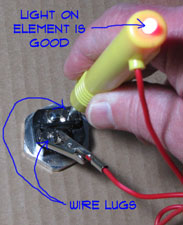 Testing a water heater element for continuity is fairly simple when you have the right tester. If power is not going through the element, it will not heat. No heat, no hot water, simple.
Testing a water heater element for continuity is fairly simple when you have the right tester. If power is not going through the element, it will not heat. No heat, no hot water, simple.
Not sure if this is the right place? See 'Troubleshooting for Electric Water Heaters' or 'Gas Water Heater Troubleshooting' for all of the water heater problems and resources.
What Is Continuity
Simply put, continuity is the ability of the wire or element to complete an electrical circuit. Electricity needs a continuous path to work. Any break or interuption will cause it to fail.
For a hot water heater, the elements are submerged in water constantly. The repeatedly heated to heat the water in the tank. Over time they deteriorate and corrode. When this happens they may lose the ability to carry an electrical current. A simple test will tell you whether or not they are still viable heating elements.
Getting the Right Tester
There are lots of fancy testers out there that can cost quite a bit of money. For this test, you just need a simple continuity tester. All it does is run an electrical charge through the element. If the current goes through and gets back to the tester, it lights up.
A continuity tester is different from a voltage tester. A voltage tester relies on the power in the wires to work. Wheras a continuity tester provides its own current via a battery. You can purchase a continuity tester for $10 to $15 at a home supply store or online.
It shold have a single lead that connects to a pen like tool that has a contact on it and a small light. The lead will have a clip on it that can attach to an electrical terminal.
NOTE: The tests noted below can also be done with a multi meter. Multi meters are a little tricky to use and beyond the scope of this article. Check out Using a Multi meter, for more information.
Testing the Element
Shutting Down the Water Heater
The first thing you want to do is turn off the power. Shut off the breaker and tag it so that no one turns it back on. Water heater element testing should only be done when the power is off.
It is very important to make sure the power is off. See the article on 'Shutting Down an Electric Water Heater' for more information. If you elements do turn out to be bad, you are going to have to follow all of the shut down steps.
Accessing Electric Water Heater Elements
An electric water heater has two elements, an upper and a lower. There are cover plates on the outside of the tank that are held in place by a couple of screws. Remove the cover plates to get to the element ends and the thermostats.
There may be some insulation that needs to be pushed back out of the way. See the picture to help you identify the element.
Performing the Continuity Test
Before you begin, you want to make sure your tester is working. Touch the leads together to make sure it is working. They have a light on them that should glow or light up when you touch the leads. If the tester fails to light up you will probably need to replace the batteries. If batteries don't help, you will need to get another tester.
One last safety check, use a voltage tester to double check that the power is off.
There are two terminals on the element. To test for continuity, attach the clip to one of the terminals, no it does not matter which one. Touch the lead to the other terminal. The light on your tester should light up or buzz depending on the tester that you have. If it does, your element is still able to accept electrical current.
The Element Passed - Next Steps
Passing this test does not necessarily mean that you are out of the woods. Obviously, you are here because you either don't have enough hot water or you have no hot water. So, if the element passed the continuity test, there is still something wrong.
You will also need to test and see if you element is grounding out. See the article, 'Testing a Water Heater Element for Ground'. This is another simple test that determines whether or not the insulation on the element is still intact. If the element grounds out, it will not work.
What If the Test Fails?
If the test fails, the element is bad and will need to be replaced. There are no other choices, they cannot be repaired and there are no moving parts.
You need to test both elements to see if they are both bad. Perform the continuity test on the other element to see if it is working.
Replacing the Elements
What If Only One Element Failed?
New elements will cost between $15 and $40, so there is a cost consideration when only one is bad.
With that said, there is some common sense to be applied here. If only one element has gone bad it is very likely that the other one is not far behind. There is a fair amount of work involved to change one element. It makes sense to replace both of them at the same time.
Purchasing and Installing Elements
Replacing the elements is a job that requires draining the tank. You will want to see the article 'Installing Electric Water Heater Elements' for complete instructions on performing.

